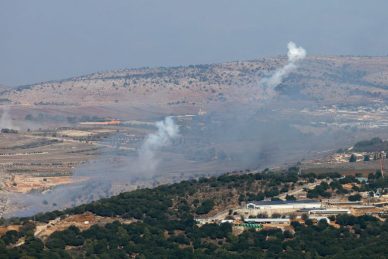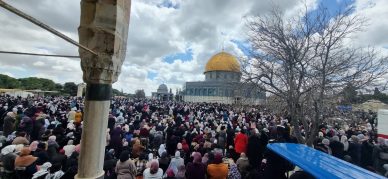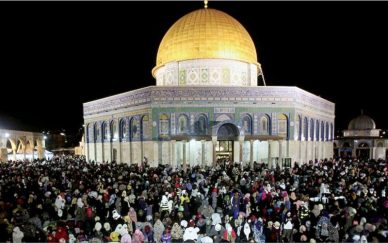An international conference concerning Jerusalem was held in Al-Rebat by the Moroccan Academy in cooperation with the Arab Parliamentary Union recently. The conference was held under the title: Is Jerusalem a Point of Meeting or Disconnection? This question was rendered as a topic for the conference by the Moroccan Monarch the chief of the Jerusalem Committee and the patron of the Moroccan Academy. The participants in this conference were comprised of Arab Parliament chiefs members of the Moroccan Academy and Arab and international experts including Dr. Saleh Bin Baker Al-Bitar who is the chief of the Arab Studies Institute in Paris and who took part in the discourse. The following are the highlights of Dr. Saleh’s lecture.
Dr. Saleh noted that it was strange that he and his classmates were directed by the government to collect money for the citizens of Jerusalem when they were in elementary school. However given the fact that he is now lecturing about Jerusalem proves that even several decades of the occupation could not abolish the intimate connection with the holy city and its holy shrine—the first kiblah and the third holiest shrine as mentioned in the Holy Qur’an. Moreover it has also been reported by Al-Bukhari in the same context. This seminar was proof of this connection as well as the subject matter that being the historical and spiritual status of Jerusalem.
The lecture was entitled “Jerusalem in the International Law”. This topic was chosen to be in harmony with the first axis of the symposium which dealt with the role of the United Nations in preventing war and occupation as well as the relevant international laws with respect to the Middle East problem especially Jerusalem and Palestine.
Owing to the limited time of the conference only the most important points of the Jerusalem Cause in the past and present were mentioned. Thereafter the emphasis was placed on the role of the United States as the influential power in the Middle East Crisis and the patron of the peace process whether in its capacity as superpower or through the devices of the UN Security Council both of which proved fruitful during the successful second phase of the Israeli withdrawal from the occupied territories even though initially Netanyahu was obstinate rejecting this step for 17 months. In particular it is worth mentioning some of his attitudes toward Jerusalem which are subject to some considerations including:
1. The security consideration which lies in preserving the security of the settlers in connection with any future arrangements in Jerusalem or in the Jordan Valley.
2. The religious/national consideration of which the colonies represent an axial dimension because it is considered on of the three pillars of the Zionist ideology—settlement defense and immigration—on the land of Israel as declared by Netanyahu in his official and press speeches.
3. The geo-political consideration which lies in the strong desire of Israel to capture most of the water resources in the West Bank approximately 600 million cubic centimetres for the benefit of the colonies around Jerusalem and in the PA territories.
In order to realize this colonial policy Netanyahu made two decisions which summed up his greed to capture all of Jerusalem. The first decision stated that settlements were to be continued despite the many decisions of condemnation or the fact that the Oslo agreement dictated that no changes would be allowed in Jerusalem before the final negotiations.
The second decision was to give the municipality of Jerusalem more authority in order to represent Metropolitan Jerusalem. To survey the history of the city it can be said that the city passed through the following stages since the beginning of this century.
The First Stage: The first stage was during the Mandate period during which there was an international obligation toward the city as stated in a survey prepared by Prince Hassan Bin Talal Jordan’s Crown Prince entitled “Jerusalem: a Legal Study” in which he said “The Mandate authority is responsible for not abandoning renting or transferring any Palestinian territories including Jerusalem.” Thereafter the cause of Jerusalem was transferred to the United Nations which recognized a Jewish and an Arab State in Palestine. The third part of the UN decision stated the special situation of the city—that being Jerusalem should be dealt with as a separate case subject to a private international law managed by the UN by a council of protection.
Ben Gurion replied that the most important issue then was Israel’s military power on which the future of the city depended. Jerusalem had been divided from between 1948 and 1967 and the international community did not recognize Jordan’s control over the Eastern part nor the Israeli control over the Western part of the city as stated by Prince Hassan Bin Talal. The two States were capturing the city through military occupation while it was supervised.
The Second Stage: During this stage the city was totally occupied by Israel as of 7 June 1967 when Moshe’ Dayyan stopped by the Wailing Wall and said “We have already unified the torn city as the capital of Israel and so we have returned to this holiest temple and we will never leave it.”
The Third Stage: This stage includes all the present conditions in the city and Israel has been actively campaigning for the following:
1. Annexing the old city.
2. Unifying the city as the municipality of Jerusalem.
3. Destroying all the estates which belong to the Palestinians.
4. Destroying the estates belonging to Awqaf in order to deprive the city of its religious features.
5. Building more colonies in and around the old city.
Mr. Faisal Al-Husseiny a member of the PLO and the chief of Jerusalem Affairs outlined the Israeli activities in Jerusalem in a lecture he delivered in Paris in response to an invitation from the Arab-European Institute of Studies in December of 1997. It was entitled “Jerusalem: Identity and History” and was divided into three parts:
1. Isolating Jerusalem from the Palestinian ambience.
2. The physical and economic deportation of the citizens in order to deprive them of their identity and force them to stay in other areas.
3. Replacing those displaced citizens with Israeli settlers and immigrants.
Accordingly the Palestinians have the right to inquire about the attitude of the United States not only as the patron of the peace process presently but also because of the great concern the Americans show toward the developments in Palestine in particular and in the Middle East in general.
Generally most people believe that Israel has been very obstinate concerning the issue of Jerusalem. This is possible because of the support of the United States which is considered a shield for the Israeli greediness and a spokesman for the Israeli ambitions and aspirations. At the same time there is an impression of Arab and Muslim leniency and an easy-going attitude toward this issue which inadvertently lends support to Israel’s cause.
Two examples of American hostility towards Arabs and Muslims must be considered.. The first took place when the U.S. used its veto against the proposal presented to the Security Council to abolish the confiscation of 53 acres in Eastern Jerusalem by Israel in order to build a Jewish settlement including 2500 houses as the first stage of a plan to confiscate an additional 500 acres. This was justified by Madeleine Albright the U.S. representative to the UN because the Security Council is not the proper place to discuss these issues. She indicated that the only way to achieve a lasting and just peace in the Middle East is through direct negotiations concerning Jerusalem between the two sides. The confiscation issue was postponed by the Israeli Prime Minister.
The second example of American hostility towards Arabs and Muslims manifested itself when the American Congress agreed by a majority on transferring the American Embassy from Tel Aviv to Jerusalem as the capital of Israel by May 1999 after preparing the building and the facilities. This proposal was sent to the American President Bill Clinton who delayed it for six more months because it could harm American interests in the area. This caused great wonder and surprise leading to questions of its real motives its legitimacy and whether the American justification was acceptable or not. Although this issue is in fact contradictory to all of the international laws and norms the masses have the right to ask “Is the American Congress the right place to discuss this issue? What is the UN attitude toward the latest American decision?” Both case are considered a fierce assault against the stability security and cooperation in the area aggravating the situation which may lead to another war.
Jerusalem in the International Law
It is necessary to analyse the special situation in Jerusalem in order to determine the illegitimacy of changing its legal condition. Also presented are the UN decisions condemning the annexation of Eastern Jerusalem as well as those that do not consider it the capital of Israel.
Second: The Illegitimacy of Changing the Legal Conditions in Jerusalem: The attitude of the world States toward the occupation of Eastern Jerusalem in 1967 reflected the special conditions of the city. The U.S. representative to the UN at that time Arthur Goldbridge declared that America considered Jerusalem one of the holiest cities on the globe and Eastern Jerusalem is an occupied territory which means legally Israel could not make any changes to it as governed by international law. Therefore all the changes made by Israel are illegal and do not determine its condition.
On 14 July 1967 the UN condemned the Israeli failure to observe resolution 2253 in which the UN confirmed the illegitimacy of the Israeli activities in the city and asked Israel to cancel all of the changes and stop any other changes that may alter the condition of the city in the future. Next on 1 July 1969 the U.S. representative to the UN at that time Charles Youst declared in a speech before the Security Council that the city had been occupied by Israel. Therefore it should be dealt with as an occupied region in which Israel cannot change its law or its management.
Third: The Security Council Resolutions Condemn the Annexation of Jerusalem and Do Not Recognize it as the Capital of Israel: The Israeli decision to make Jerusalem its permanent capital represented a sharp challenge to its international legitimacy while at the same time contradicting all the international laws as well as the Security Council resolutions especially resolution 250 and 253 in 1968 which nullified all the Israeli legislative and administrative activities that might change the condition of the city specifically the buildings and the land. Moreover this was emphasized in resolution 267 in 1969 which also nullified all of the Israeli legislative and administrative activities. Then there was resolution 465 in 1980 which asked Israel to remove all of the settlements in the occupied territories including Eastern Jerusalem and resolution 478 in 1980 which confirmed the two previous resolutions and asked all the Member countries not to transfer their diplomatic corps to Jerusalem. Finally resolutions 672 and 673 in 1990 and resolution 904 in 1994 all of which considered Jerusalem an occupied territory and condemned all of the violent actions against the Palestinians especially the massacre in the yard of Al-Aqsa Mosque in October of 1990.
All of these resolutions have been accepted by the world community and they all emphasized that Eastern Jerusalem is an occupied region whose demographic and political conditions should not be changed according to international law. Consequently any change of the sort is illegal because the UN does not recognize any changes as a result of the Israeli aggression against the Arab States because they are against the international laws. On the other hand the UN supports the principle of legitimacy which respects the regulations instead of the principle of effectiveness in which the current condition justifies the illegal Israeli activities. Because these principles are relevant to the uppermost and essential interests of the world community those who design them should observe these principles and not violate them to satisfy the desires of any country. Finally these principles are true and powerful enough to nullify any violations against them.
In conclusion the right cannot be based on the wrong and when this wrong is related to the regional change among the countries we face a case of severe violation of international regulations and rules which should be stopped unanimously.















